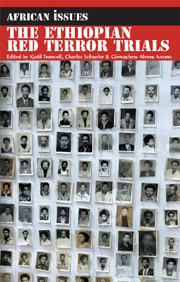Book contents
- Frontmatter
- Contents
- Notes on Contributors
- Preface
- Acknowledgements
- Abbreviations
- Glossary of Amharic Phrases
- 1 The ‘Red Terror’ Trials
- 2 The History of the Red Terror
- 3 The Rights of the Accused
- 4 The Role of the Special Prosecutor's Office
- 5 The Red Terror Trials versus Traditions of Restorative Justice in Ethiopia
- 6 A Quest for Justice or the Construction of Political Legitimacy?
- 7 Building State & Nation
- 8 Beyond the Red Terror Trials
- 9 Concluding the Main Red Terror Trial
- Index
3 - The Rights of the Accused
A Human Rights Appraisal
Published online by Cambridge University Press: 12 September 2012
- Frontmatter
- Contents
- Notes on Contributors
- Preface
- Acknowledgements
- Abbreviations
- Glossary of Amharic Phrases
- 1 The ‘Red Terror’ Trials
- 2 The History of the Red Terror
- 3 The Rights of the Accused
- 4 The Role of the Special Prosecutor's Office
- 5 The Red Terror Trials versus Traditions of Restorative Justice in Ethiopia
- 6 A Quest for Justice or the Construction of Political Legitimacy?
- 7 Building State & Nation
- 8 Beyond the Red Terror Trials
- 9 Concluding the Main Red Terror Trial
- Index
Summary
Introduction
Ethiopia experienced gross and widespread human rights violations during the years 1974 to 1991. The military regime of Col. Mengistu Hailemariam – the Derg and its Worker's Party of Ethiopia (WPE) – is well-known for its brutality, especially because of the summary executions of a large number of Emperor Haile Selassie's political officials, including the Emperor himself, and the atrocious Red Terror campaign against so called anti-revolutionaries and reactionary elements. The well organized campaign of systematic violations of human rights resulted in thousands of summary executions, disappearances and cases of torture. The Derg's violent campaigns to strike down insurgencies amounted to gross violations of human rights and humanitarian laws, both under national and international law.
Following the downfall of the Derg regime in May 1991, a Transitional Government of Ethiopia (TGE) was established and assumed its responsibility under international law to exercise the state's criminal jurisdiction over those responsible for the atrocities committed by the Derg regime. In the initial phase, a large number of suspects were rounded up and detained. People were ordered to report to their kebele about suspected perpetrators. There was a widespread practice of presenting suspects to general meetings at the kebeles where their cases were discussed on the basis of information gathered from witnesses. Approximately 2,000 suspects were detained by EPRDF forces in the first years after the downfall of the Derg regime, the majority of whom were detained shortly after May 1991.
- Type
- Chapter
- Information
- The Ethiopian Red Terror TrialsTransitional Justice Challenged, pp. 33 - 50Publisher: Boydell & BrewerPrint publication year: 2009



